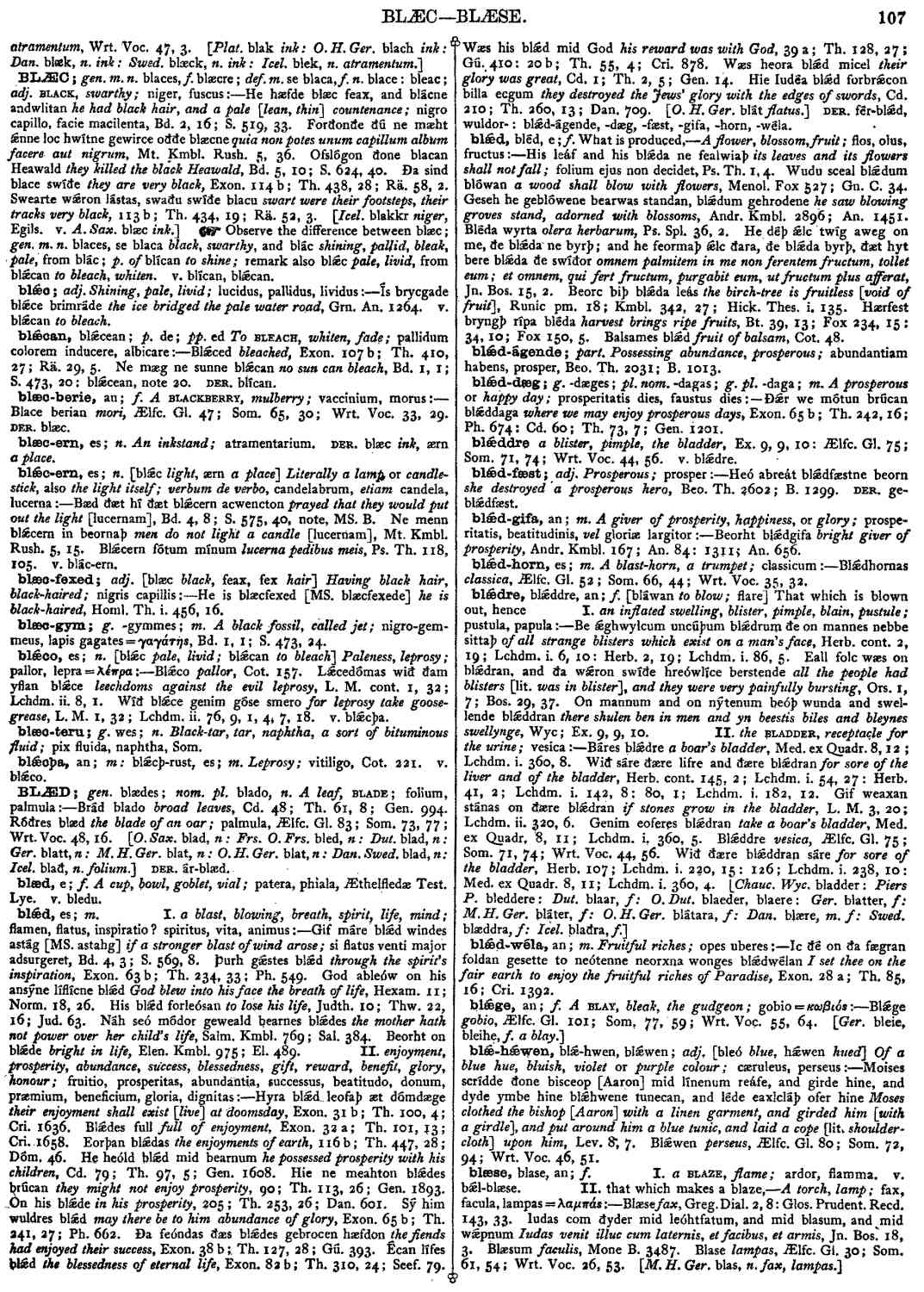blǽd
- noun [ masculine ]
-
Gif máre blǽd windes astág [MS. astahg]
if a stronger blast of wind arose;
si flatus venti major adsurgeret,- Bd. 4, 3; S. 569,
8.
-
Þurh gǽstes blǽd
through the spirit's inspiration,
- Exon. 63 b; Th. 234, 33; Ph. 549.
-
God ableów on his ansýne líflícne blǽd
God blew into his face the breath of life,
- Hexam. 11; Norm. 18, 26.
-
His blǽd forleósan
to lose his life,
- Judth. 10; Thw. 22, 16; Jud. 63.
-
Náh seó módor geweald bearnes blǽdes
the mother hath not power over her child's life,
- Salm. Kmbl. 769; Sal. 384.
-
Beorht on blǽde
bright in life,
- Elen. Kmbl. 975; El. 489.
-
Hyra blǽd leofaþ æt dómdæge
their enjoyment shall exist [live] at doomsday,
- Exon. 31 b; Th. 100, 4; Cri. 1636.
-
Blǽdes full
full of enjoyment,
- Exon. 32 a; Th. 101, 13; Cri. 1658.
-
Eorþan blǽdas
the enjoyments of earth,
116 b;- Th. 447, 28; Dóm. 46.
-
He heóld blǽd mid bearnum
he possessed prosperity with his children,
- Cd. 79; Th. 97, 5; Gen. 1608.
-
Hie ne meahton blǽdes brúcan
they might not enjoy prosperity,
- 90; Th. 113, 26; Gen. 1893.
-
On his blǽde
in his prosperity,
- 205; Th. 253, 26; Dan. 601.
-
Sý him wuldres blǽd
may there be to him abundance of glory,
- Exon. 65 b; Th. 241, 27; Ph. 662.
-
Ða feóndas ðæs blǽdes gebrocen hæfdon
the fiends had enjoyed their success,
- Exon. 38 b; Th. 127, 28; Gú. 393.
-
Écan lífes blǽð
the blessedness of eternal life,
- Exon. 82 b; Th. 310, 24; Seef. 79.
-
Wæs his blǽd mid God
his reward was with God,
39 a;- Th. 128, 27; Gú. 410: 20 b; Th. 55, 4; Cri.
878.
-
Wæs heora blǽd micel
their glory was great,
- Cd. 1; Th. 2, 5; Gen. 14.
-
Hie Iudéa blǽd forbrǽcon billa ecgum
they destroyed the Jews' glory with the edges of swords,
- Cd. 210; Th. 260, 13; Dan. 709.
Bosworth, Joseph. “blǽd.” In An Anglo-Saxon Dictionary Online, edited by Thomas Northcote Toller, Christ Sean, and Ondřej Tichy. Prague: Faculty of Arts, Charles University, 2014. https://bosworthtoller.com/4583.
Checked: 0